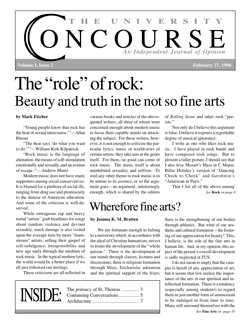Core curriculum (1)
by R.J. Convery
Regarding Dr. John Crosby’s article: “Shouldn’t we have a real core curriculum at Franciscan University?” published in the first issue of the Concourse:
Dr. Crosby’s listing of specific courses or numbers of courses without categorizing within the areas of knowledge of our Core Program Requirements serves to mislead the reader. The vast majority of our courses have been classified, with faculty approval, as Communications, Humanities, Natural Science, Social Science, or Theology core.
A sequence of courses in an academic discipline is based upon published pre-requisites for different courses. The need for course pre-requisites is an academic decision which has been made by the faculty of each academic department. Hopefully, the faculty of an academic department are cognizant of the syllabi for courses which are offered by that department and do not have to rely on the contents of specific books.
In our Philosophy of the Curriculum, our Professors are charged to “lead their students in developing a sense of the unity of knowledge” and to be examples of those “who practice just and balanced judgment in all their teaching, writing, and professional practice.” Teachers can bring their life experiences to the classroom to show the way for the students. Yet, should we not expect students to assume some of the responsibility for, and ownership of, their learning?
In the “Knowledge Its Own End” chapter of The Idea of a University, Cardinal Newman writes: “It is a great point then to enlarge the range of studies which a University professes, even for the sake of students; and, though they cannot pursue every subject which is open to them, they will be the gainers by living among those and under those who represent the whole circle.” This, I suppose, tells us that classes in a specific subject are but a part of a liberal education. The interactions among students, faculty, and advisors are an important part of this education.
The comparison of the feelings or thoughts of a professional, with fifteen years of life experience, with those who have just completed a course of study can lead to false conclusions. I too had a “bunch of courses,” although very specific, as part of my general degree requirements. Not until I was relieved of the concern to pass certain courses did I begin to see the relationships among the branches of knowledge. Forty years later, I still stumble across these relationships as I live my life and practice my profession.
Changes in our Core Program Requirements were not, as Dr. Crosby assumes, “strongly conditioned by the trends” of 1974. The changes were adopted by the faculty after some experimentation and much debate. Since then, the requirements have been modified in an effort to correct problems. The hope (fulfilled or not) was to have the students become exposed to different areas of knowledge. They then could pursue areas of interest outside their major concentration, through electives.
Perhaps we should not hastily deduce that the common denominator of our students and alumni is a lack of coherence in the general education at Franciscan University. Is it not the University’s Mission Statement that identifies us as being Franciscan and Catholic? Do we not want our students to remember their entire University experience rather than an emphasis on a “grateful recognition that the program of general education as a whole has been a decisive learning experience?”
Dr. R.J. Convery, Professor of Chemistry with contributions from Dr. M.A. Sunyoger, Assistant Professor of English


